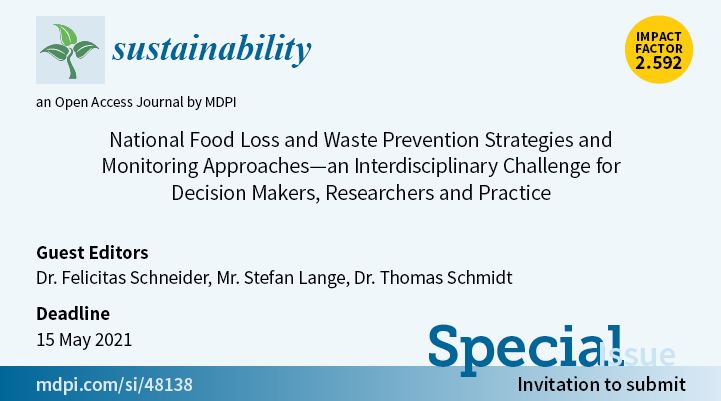There are only nine years left until the member countries of the United Nations are supposed to have achieved target 12.3 of the sustainability agenda: halving food waste in retail, out-of-home catering and private households and reducing food losses in the upstream value chain. Reason enough to draw up a global interim balance and to gather both positive and negative experiences with national strategies and their implementation. In May 2020, our colleagues Thomas Schmidt, Stefan Lange and Felicitas Schneider launched a call in the international research community to publish scientific results in a special issue of the journal Sustainability that they edited together.
In total, ten articles from nine countries could be published, covering all five continents: one contribution each was contributed by Egypt, Germany, Great Britain, Italy, Japan, New Zealand, the Netherlands and the United States of America, while two articles were written in Saudi Arabia. In terms of content, colleagues shared their experiences from losses in primary production to food waste from private households, addressing methodological proposals, challenges and experiences in national monitoring, global knowledge gaps, effects of innovative technologies, policy options for action as a G20 presidency country and practical lessons learned from the implementation of waste prevention measures.
All articles were critically examined by professional expertise and the corresponding feedback was incorporated by the authors. The publications are freely accessible to the public and can be downloaded free of charge.
We would like to thank all those involved for their contribution to the current state of play in the field of national strategies against food loss and waste.
Service for Download:
Special Issue Sustainability „National Food Loss and Waste Prevention Strategies and Monitoring Approaches“

![[Translate to English:] [Translate to English:]](/media/_processed_/3/e/csm_AdobeStock_249730128_92f14d3a63.jpeg)
![[Translate to English:] [Translate to English:]](/media/_processed_/3/e/csm_AdobeStock_249730128_a6fcf4c893.jpeg)




